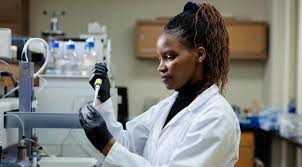A phd in biomedical sciences provides students with the knowledge, skills, and practical experience necessary to make substantial contributions to the advancement of science. The program emphasizes rigorous research, analytical thinking, and innovation, preparing graduates to tackle complex problems in medicine, biotechnology, and clinical research. By engaging in advanced scientific training, students are positioned to drive discoveries that influence both academic and healthcare landscapes.
Through this program, candidates gain expertise in identifying scientific questions, designing experiments, analyzing data, and interpreting results to generate new knowledge. Graduates emerge as independent investigators, capable of leading research projects, collaborating across disciplines, and developing innovative solutions to pressing biomedical challenges.
Structured Curriculum for Scientific Mastery
The PhD program offers comprehensive coursework in fundamental biomedical sciences such as molecular biology, cell biology, physiology, biochemistry, and immunology. In addition, specialized electives in areas like genomics, proteomics, neuroscience, and pharmacology allow students to focus on their research interests.
Courses in experimental design, biostatistics, and computational biology enhance critical thinking by teaching students to evaluate literature rigorously, design reproducible experiments, and interpret complex datasets. This structured approach equips candidates to approach scientific questions methodically, making informed decisions that drive research forward.
Hands-On Laboratory Experience
Laboratory training is central to the PhD experience. Students acquire proficiency in techniques such as CRISPR gene editing, high-throughput sequencing, flow cytometry, advanced microscopy, and protein analysis. These experiences reinforce problem-solving skills, as students troubleshoot experimental issues, optimize protocols, and adapt methods to achieve reliable results.
Hands-on research also fosters critical thinking by requiring candidates to assess experimental outcomes, question assumptions, and integrate findings with current scientific knowledge. The ability to navigate experimental challenges ensures that graduates are prepared to generate meaningful, high-quality research.
Independent Research and Dissertation Work
Independent research forms the core of the PhD program. Students design and conduct projects that address novel questions in biomedical science, contributing to the broader scientific community. Dissertation work involves formulating hypotheses, collecting and analyzing data, and synthesizing findings into coherent conclusions.
Engaging in independent research develops problem-solving capabilities, as students must navigate unexpected results, methodological challenges, and data interpretation. This process also sharpens critical thinking, as candidates evaluate evidence, refine hypotheses, and integrate their results within the larger context of scientific literature.
Interdisciplinary Collaboration
Modern biomedical research often requires collaboration across fields such as computational biology, chemistry, pharmacology, and clinical medicine. PhD students engage in interdisciplinary projects, learning to communicate complex concepts, coordinate research approaches, and combine expertise from multiple areas.
Collaborative work enhances problem-solving skills by exposing students to diverse perspectives and innovative methodologies. Team-based research also fosters leadership, project management, and the ability to synthesize information from different scientific domains, preparing graduates to lead complex research initiatives.
Computational Tools and Data Analysis
Training in bioinformatics and computational biology equips students with the ability to manage large datasets, analyze biological information, and develop predictive models. Computational skills strengthen critical thinking by allowing students to detect patterns, evaluate anomalies, and validate experimental results.
Integrating computational tools with laboratory research promotes innovative problem-solving, enabling graduates to develop new approaches to address scientific and healthcare challenges. These skills are essential for modern biomedical research, where large-scale data analysis drives discovery and application.
Translating Research into Practice
PhD graduates are trained to apply their findings to real-world healthcare challenges, including understanding disease mechanisms, creating therapeutics, and developing diagnostic tools. This translational focus requires critical thinking to ensure that research outcomes are scientifically sound and relevant to clinical or technological applications.
Problem-solving is central to this process, as students must adapt experimental approaches, anticipate potential limitations, and identify the most effective strategies for implementing research findings. Graduates emerge capable of contributing practical solutions that advance medicine and healthcare technologies.
Professional Development and Leadership Skills
The PhD program emphasizes professional growth alongside scientific training. Students mentor junior researchers, manage laboratory projects, and participate in collaborative studies. These experiences build leadership, communication, and strategic planning abilities.
Leadership in science requires critical thinking to evaluate complex information, solve experimental challenges, and guide research teams effectively. Graduates are equipped to manage research projects, contribute to publications, and influence the trajectory of biomedical innovation.
Ethical Conduct in Research
PhD candidates are trained in research ethics, responsible conduct, and laboratory safety. Maintaining accurate records, ensuring reproducibility, and adhering to ethical guidelines reinforces the importance of accountability in scientific work.
Ethical considerations strengthen critical thinking by encouraging students to evaluate the broader implications of their research and make decisions that align with best practices. Problem-solving within an ethical framework ensures that outcomes are both innovative and responsible.
Scientific Communication and Networking
Effective communication is essential for scientific impact. PhD students present research findings at conferences, seminars, and workshops, receiving feedback from peers and experts. Networking opportunities expose students to emerging methodologies and current trends in biomedical science.
Communication skills enhance problem-solving by enabling researchers to articulate challenges, discuss solutions, and refine experimental approaches. Networking also creates avenues for collaboration, research partnerships, and future career opportunities.
Technology Integration in Research
PhD candidates leverage advanced technologies such as high-resolution imaging, laboratory information management systems, and computational modeling to conduct research. Technological proficiency enhances critical thinking by allowing students to evaluate methodologies, optimize experiments, and interpret complex results.
Advanced tools also support problem-solving, enabling students to approach scientific challenges creatively and develop robust solutions. Familiarity with modern research technologies ensures graduates are well-prepared for leadership roles in scientific and clinical settings.
Career Prospects and Impact on Science
Graduates with a PhD in Biomedical Sciences are prepared for careers in academia, industry, biotechnology, pharmaceuticals, and healthcare research. They possess the analytical, experimental, and leadership skills required to conduct independent research, guide scientific teams, and influence the development of innovative healthcare solutions.
Critical thinking and problem-solving skills are highly valued in positions that require experimental design, data interpretation, and decision-making. Graduates contribute to the advancement of biomedical science by developing new therapies, diagnostics, and evidence-based practices that improve patient care.
Contributions to Scientific Knowledge
PhD candidates trained in advanced research methodologies contribute to the expansion of scientific understanding. They identify gaps in knowledge, design experiments to address unanswered questions, and interpret results to generate new insights.
Graduates become independent investigators capable of synthesizing information across disciplines, designing innovative studies, and delivering impactful research. Their contributions shape the future of biomedical science and support the development of solutions to complex health and medical challenges.
Conclusion
A PhD in Biomedical Sciences equips graduates with the knowledge, skills, and experience to shape the future of science. Through structured coursework, laboratory training, independent research, and interdisciplinary collaboration, students develop critical thinking and problem-solving abilities essential for addressing complex biomedical challenges.
Training in computational biology, data analysis, and emerging technologies further enhances the capacity to translate research into meaningful healthcare outcomes. Ethical training ensures graduates maintain accountability and integrity in their work, while professional development prepares them to lead research teams and manage projects effectively.
Graduates are poised to influence scientific advancement by generating new knowledge, developing innovative healthcare solutions, and leading research initiatives. With access to advanced facilities such as UNT Health Fort Worth, PhD candidates gain the resources, mentorship, and collaborative networks necessary to become leaders in biomedical science, shaping the future of medicine, biotechnology, and healthcare.
The program produces independent investigators who combine analytical rigor with practical application, enabling them to navigate complex challenges, integrate multidisciplinary approaches, and deliver impactful research. By equipping graduates with these capabilities, a PhD in Biomedical Sciences empowers the next generation of scientists to advance discovery and drive meaningful change in science and healthcare.










